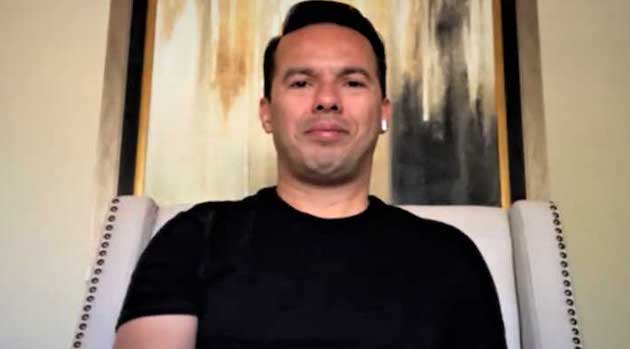Pastor Samuel Rodríguez (NHCLC USA) analyses the caravan of Central American migrants walking towards the border of the United States.
 Samuel Rodríguez during the interview. / Global News Alliance
Samuel Rodríguez during the interview. / Global News Alliance
Samuel Rodríguez, director of the National Hispanic Christian Leadership Conference (NHCLC), is one of the best-known Hispanic pastors in the United States.
In an interview with Latin American news website Evangelico Digital, he spoke about the caravan of migrants who have traveled throughout Central America in the last weeks, to approach the United States border.
Samuel Rodríguez was one of the pastors invited to pray at the inauguration day of the current president of the United States, Donald Trump.
Writer and speaker, Rodriguez has been a strong advocate of an immigration reform that regulates the situation of the undocumented and establishes better measures for the legal entry to the United States.
Question. What should be the response of the churches in Mexico and the United States to the caravan of migrants?
Answer. It has to be a reponse in different ways. Let me explain it: It is obvious that we must fulfill our duty as Christians, which we can read in Matthew 25, to feed, to cloth, and to take care of others.
We are Christian before being Mexican or American. Our Christ-centric commitment should always be what leads us.
At the same time, Mexico and the United States are committed to protecting their own borders. We know that 70% of those who come in this caravan are young men, under 40 years of age. They have the ability to work and if there is no work, Mexico has said that it will provide and give opportunities to work.
The commitment of the church in Mexico is to try to help, to have compassion. The current US administration is not going to help, they are sending the army to the border. Therefore, the church in Mexico can help them to find a job, it can integrate them into Mexican society.
In the church in the United States, we have to be praying, interceding, asking that, if any of these people manage to enter, they should be treated with the respect they deserve; but without supporting the illegal entry into this country.
Q. Why is there so much fear in the Unites States of migrants from Latin America?
A. I have been involved in this debate for 20 years. The fear is not against the 'Latino' or against the immigrant, but against illegal entry.
The United States is a sovereign country, with the right to protect its sovereignty like any other country. We have seen the rise of well-known Latin politicians, such as Marco Rubio, whom people love and appreciate. So I do not think there is anti-'Latino' sentiment, but rather anti-illegal entry.
Q. Do you think that the churches in the Central American countries are alleviating the problems?
A. We have the best churches in Latin America: beautiful churches, full of people committed to the gospel of Jesus Christ. There are many who are working not only to give assistance, but also to train many in employment skills, so that their families can better their situation.
We need to do a better job in Latin evangelical churches worldwide. I woulr like to see the churches be the first ones in training our families educationally and in job skills, so that no one has to participate in a caravan to try to illegally enter the United States.
If we commit to follow John 10.10, to have life and life in abundance, I believe we can do it. There are resources, there is encouragement, and above all, there is the Spirit of God.
Q. How should we see migrants?
A. We must see them as we must see every human being: as a person who carries the image of God. They must be treated with dignity, respect and love. We have to take care of the migrant and help him at the same time.
But we have to make a distinction between people who break the law, and those who are legitimately looking for a new day.
Like Jesus, we have to feed and clothe others, help those in need, but at the same time, respect what Paul tells us in Romans 13, which is to respect the laws of government. As Christians, we can do both.

Las opiniones vertidas por nuestros colaboradores se realizan a nivel personal, pudiendo coincidir o no con la postura de la dirección de Protestante Digital.
Si quieres comentar o